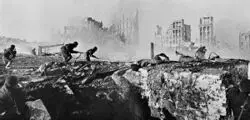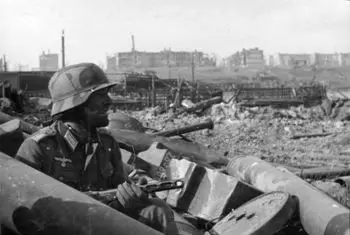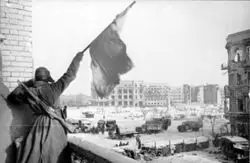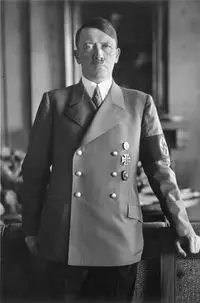Why did Germany lose the Battle of Stalingrad
The Battle of Stalingrad, fought by the Soviet Union and German forces, was a decisive victory for the USSR that turned the war's tide in the Allies' favor. Germany's defeat at Stalingrad was not only a catastrophic German loss but put Germany on the defensive for the rest of the war. Stalingrad halted the German invasion of Russia and turned the tide of World War Two in Europe.
Why were the Germans defeated, and how did the Soviet Union manage to win the Battle of Stalingrad? The German army was hobbled by Hitler's micromanaging and tactics, intransigence, and poor German battlefield leadership. The Soviet's benefitted from superior Soviet leadership, numbers, and tactics.
Why was the initial German invasion of the Soviet Union successful?
In June 1941, Germany invaded the Soviet Union. It was a surprise attack that violated the Molotov-Ribbentrop treaty signed in 1939 between Germany and the Soviet Union. The agreement was a non-aggression pact between Germany and the Soviet Union intended to ensure that neither country attacked the other.[1] Up to one million German soldiers and their allies pushed into the western Soviet Union on the first day of the German invasion. As a result of their tactical surprise, the German army achieved a series of spectacular victories. Despite heroic Soviet resistance, Germany seized much of present-day Belarus, Ukraine, and the Baltic States.[2] The Red army suffered spectacular reverses and sustained massive losses. Hundreds of thousands of Soviet troops were killed and up to a million and a half taken prisoner. A quarter of a million men surrendered during the German capture of Kyiv, alone.[3]
The German invasion had been facilitated by Stalin's indecisiveness, who was taken aback by Hitler’s betrayal. He initially refused to believe the reports of a German invasion. The supreme leader of the Soviets possibly suffered a nervous breakdown in the early stages of the invasion. However, after some time, he helped direct the Soviet counter-attack. By the autumn of 1941, it appeared that Germany’s blitzkrieg tactics would lead to the defeat of the Red Army.
Why did the German invasion of the Soviet Union stall in 1941?
However, winter arrived early that year, and this slowed down the German advance. Russians spoke of ‘General Winter’- who would help them to win the war. [4] The Soviet people were well aware that the severe Russian winters would slow if not halt the German advance, just as it had stopped Napoleon and Charles XII of Sweden during previous invasions. By December 1941, the German’s vanguard was ‘some fifty miles from Moscow.’[5]
The harsh weather slowed the German advance. German soldiers began to suffer in incredibly harsh conditions. Like Napoleon's army in the 19th Century, the Russian weather took its toll on the German forces. The Soviets used the weather to their advantage. The Soviets stationed considerable forces in the east to defend Siberia from a Japanese invasion. Staling withdrew these troops and placed them under the command of General George Zhukov. They were then organized into a strike force aimed at repelling the German advance on Moscow. On December 12th, Zhukov’s army launched a surprise attack on the German frontline and pushed them back with heavy losses some hundred miles from Moscow.[6] The Soviet Capital had been saved. However, despite the setback, the Germans had a secure hold over much of the western Soviet Union and had laid siege to Leningrad.
Why did Hitler attack Stalingrad?
Hitler's General Staff had intended to ‘win the war by Christmas.’ [7] However, despite defeat near Moscow, there was still widespread optimism among the German generals. The German general staff eventually stabilized the German front line and fended off further Soviet attacks during early 1942. Hitler and his generals planned a Spring offensive that they hoped would lead to Stalin suing for peace or unconditional Soviet surrender.
Instead of thrusting forward towards the Soviet capital again, the Germans decided to launch an attack on the south. The German army led by the sixth army was to advance into the southern Russian Steppe. Hitler and his army had only limited access to oil, and he believed that if his army could occupy the oil fields, then his army could advance into the Middle East. [8]
In the late summer of 1942, the German army engaged in a rapid advance through southern Russia. It was reminiscent of the early days of Barbarossa. The 6th army was invincible, and they defeated a series of Russian divisions and armies. By August, they were on the Volga near the city of Stalingrad. The city (today Volgograd) had been renamed Stalingrad in honor of Stalin, who had seized the city from the White Counter-Revolutionaries in 1920. [9]
How did Hitler’s Mistakes change the course of the Battle of Stalingrad?
Hitler saw the war regarding his rivalry with Stalin, and he decided to attack the city because of its symbolic value. However, the original aim of the offensive in Southern Russian was to secure the oil fields in the Caucasus. The oil was essential for the German war machine.
Hitler knew this – instead of opting for concentrating all his forces on the conquest of the oil fields, he made perhaps a fateful mistake. He divided his forces. It has long been one of the fundamental beliefs in military strategy that it was reckless to divide enemy territory forces. However, this is exactly what Hitler did, contrary to all the advice of his Generals.[10] He sent some of the German armies south to take the oil fields in the Caucuses and their prime objective was Baku.
Hitler then ordered the 6th Army to advance towards Stalingrad and take the city, even though it lacked strategic value. The idea of capturing Stalingrad fixated Hitler, and it became his obsession. This obsession led him to ignore the reality on the ground and his general's advice. This mistake destroyed the German 6th army. Not only had Hitler divided his forces, but he also allocated too little men and material to the capture of Stalingrad.
It was usually accepted at the time, and since that, an attacking force needs to have at least a 3 to one advantage over the defenders to achieve their goals. The Germans did not have the necessary numerical advantage over the Soviets.[11] This made the 6th army’s prospect of success very uncertain.
Furthermore, Hitler, in his obsession to seize the city, meant that he was not fully aware of the situation around the city. For example, German forces had been unable to push back Soviet forces during the series of battles known as the Kolton Operations. This left the Germans exposed on their flanks as they pressed further into the city. Because Hitler divided the German forces, the flank of the 6th army was insufficiently protected.[12] Poorly trained Romanian and Italian troops guarded the flanks, and many German commanders privately believed that they could not protect their rear from Soviet attack.
Hitler’s determination to capture Stalingrad meant that he dispatched the 6th army on a mission that was unlikely to achieve its objectives and placed it at great risk. Hitler's interference hampered the 6th Army's throughout the siege of Stalingrad. Hitler's style of leadership was the complete opposite of Stalin's. The Soviet leader had reformed the Soviet High Command, the Stavka, and granted ‘more autonomy and independence’ to Zhukov's capable generals.[13] The leader of the Soviet Union had learned lessons from the early days of Operation Barbarossa. He let his generals do the fighting and draw up the strategies needed to beat the Germans. [14]

How did Germany try to change the course of the Battle of Stalingrad?
The Germans launched a massive air assault on the city, under the command of General Paulus. Much of the city was reduced to rubble. The Germans devoted some of their finest units to the city's capture, much against senior Generals such as Von Kleist’s wishes, who openly opposed Hitler’s wish to capture the city. In August of 1942, the Germans fought their way into the city, which was first lightly defended. The Soviet commander of the Soviet forces was Vasily Chuikov, who was 42 years old and led the Soviet 62nd Army. He was to prove to be an indomitable fighter and an inspirational leader.[15] He organized his army and many of the city's civilians into a formidable defensive force.
Chuikov and the defenders used the city's rubble as defensive cover and to slow down the German advance. They also put up a suicidal resistance and fought for every street and building. Soviet snipers decimated the German forces. After three months of fierce fighting, the Germans eventually captured some 90% of the city and reached the Volga. It appeared that they were on the verge of victory. The Soviets had been building up their forces in great secrecy to the north and the south of the city. Amazingly, German intelligence did not spot the massive build-up of Soviet divisions. The Soviets under Zhukov attacked the 6th army’s flank as they continued to capture the last remaining pockets of resistance in Stalingrad. The Soviets deliberately selected those sectors of their allies' German lines, such as the Hungarians and the Romanians. The Soviet High Command estimated that these units would not fight and would quickly surrender. On the night of the 23rd of November, the Red Army attacked and quickly swept passed the Hungarian, Rumanian, and Italian divisions and they began to encircle the 6th army in Stalingrad, just as it was on the verge of seizing the city.[16]
Why did Hitler want to win the Battle of Stalingrad despite its costs?
By 1942, Hitler had been very successful in all his campaigns. He had only experienced defeat at the Battle of Britain and near Moscow. However, neither defeat had stopped the German war machine from going on the offensive and from securing more victories on the face of it. Hitler, as commander in chief of the army, had great faith in his military abilities and as a strategist. He believed that he was a military genius and was destined to lead the German people to victory. Central to Hitler’s views on military tactics was that willpower could achieve anything on the battlefield.
Hitler believed that if German soldiers were well-led and motivated, then there was nothing that they could not do, no enemy that they could not defeat. Hitler, when he heard that his army was on the point of being encircled at Stalingrad, ordered that the 6th Army should not retreat, and he demanded that they fight on with greater zeal. Hitler, while admitting that the situation in Stalingrad was dire, believe that if the German soldiers and their officers had faith in the final victory, then they would be victorious. This belief meant that Hitler curbed his officers' ability to respond to the developing situation on the ground.[17]
The Soviet counteroffensive, which was launched on 19th November, from the Kalmyk Steeped, in a pincer movement, simultaneously attacked the Germans from the North and outflanked the 6th army. Eventually, the Red Army would come to encircle the Germans completely, but this took a week or more to achieve. In this time, Paulus could have retreated west and towards Von Manstein, who was fighting in the Crimea.[18] Before the encirclement was complete, Paulus should have left Stalingrad and ordered a retreat.
However, because of Hitler's order to not retreat under any circumstances, Paulus stayed in Stalingrad, and he and his army became trapped in the city on the 23rd of November, 1942. Over a quarter of a million Germans had been cut-off in the city on the Volga. Undoubtedly, Paulus's own indecisive character played its part. Still, Hitler’s orders to stand and fight and never to concede ground meant that the Germans did not conduct a tactical retreat and avoid the slow death of the 6th army in the winter of 1942-43.[19]
Could the 6th army have been saved?
News of the German divisions' encirclement under Paulus was a severe blow to Hitler, and he ordered an immediate attack to relieve the encircled forces in Stalingrad. Goering intervened and believed that the Luftwaffe or German air force could re-supply Paulus’ army. Goering promised Hitler that he would supply the Germans in Stalingrad with all that was needed. In the end, the Luftwaffe’s efforts to supply the besieged forces were utterly inadequate. It has been estimated that the German air force only dropped one-quarter of the material and the food that the German soldiers needed to fight and survive in the Russian Steppe during the winter.
The failed Luftwaffe efforts to supply German soldiers caused morale in the city to fall. Many German officers even argued that they should surrender. On December 19th, the gifted German General Eric von Manstein and a significant German division attempted to reach Stalingrad. Operation Winter Storm was initially successful, despite it occurring during the depths of winter.
Von Man stein’s forces came within thirty kilometers of the besieged Germans, but Paulus refused to break out and link up with the relief forces. He possibly could have saved some of his troops. However, this would have required him to disobey Hitler’s explicit orders. In the end, he refused to do so, and the opportunity was lost. If Hitler had allowed his generals more flexibility, Von Paulus could have saved some of his divisions from complete annihilation.[20]
How did the Stalingrad Halt the German Invasion of Russia?
In February 1943, Von Paulus surrendered the remaining starving and ragged German forces in Stalingrad. Finally, he had defied Hitler’s orders to fight to the last man and bullet. The German defeat had been devastating. They had lost half a million, either killed or captured. After the Soviet victory, the Germans lost a significant amount of territory in the south of Russia.[21] Stalingrad halted Germany's invasion into Russia. Instead of advancing, the German army engaged in a long slow retreat.
However, the German army was far from defeated, and in early 1943, Von Manstein inflicted a devastating defeat on the Red Army at Kharkov.[22] However, the German army had lost its aura of invincibility, and the Soviets believed that they could defeat. Furthermore, after Stalingrad, many more Germans became critical of Hitler and his policies. This was particularly the case in the German military. After the debacle, there have even been suggestions that the German generals conspired to start a mutiny in the army and depose Hitler.[23] However, these plots did not succeed.
Why was the Battle of Stalingrad a catastrophe for Germany?
Stalingrad was one of the most important battles in WW II, if not in entire human history. It was a catastrophic defeat for the German army, and they never recovered from the battle. The defeat was avoidable. The main reason for the defeat was that Hitler became obsessed with the idea of capturing the city. This irrational behavior led him to ignore his Generals' warnings and to make several strategic mistakes. Hitler's mistakes and errors allowed the Soviets to take advantage of the situation to encircle and annihilate an entire German 6th army. The responsibility for the cataclysmic defeat was Hitler's.
Furthermore, he compounded his initial errors by refusing to allow Paulus to force a way out of Stalingrad his General could have saved some of the German forces and mitigated the consequences of Hitler’s mistakes. Hitler’ meddling, misguided strategy, and poor tactics meant that the 6th army was doomed to defeat at Stalingrad.
References
- Jump up ↑ Antill, Peter, Stalingrad 1942 (Osprey Publishing, London, 2007), p. 18
- Jump up ↑ Bellamy, Chris, Absolute War: Soviet Russia in the Second World War. New York: Alfred A. Knopf & Random House.2007), p. 23
- Jump up ↑ Antill, p. 18
- Jump up ↑ Bellamy, p. 67
- Jump up ↑ Antill, p. 45
- Jump up ↑ MacDonald, John. Great Battles of World War II (London, Michael Joseph books, 1986), p. 245
- Jump up ↑ MacDonald, p. 234
- Jump up ↑ Antil, p. 115
- Jump up ↑ Antil, p. 117
- Jump up ↑ Beevor, Antony, Stalingrad: The Fateful Siege: 1942-1943 (Viking, London, 1998), p. 117
- Jump up ↑ Beevor, p. 119
- Jump up ↑ Beevor, p. 156
- Jump up ↑ Zhukov, Georgiĭ Konstantinovich & Harrison E., Salisbury, Marshal Zhukov's Greatest Battles (New York: Harper & Row, 1969), p. 116
- Jump up ↑ Beevor, p. 178
- Jump up ↑ Beevor, p. 173
- Jump up ↑ Antil, p. 135
- Jump up ↑ Victor, George, Hitler: Pathology of Evil (Washington, DC: Brassey's Inc.2008) p. 208
- Jump up ↑ Anthill, p. 156
- Jump up ↑ Beevor, p. 158
- Jump up ↑ Hoyt, Edwin Palmer. 199 Days: The Battle for Stalingrad (New York: A Forge Book, 1999), p. 167
- Jump up ↑ Hoyt, p. 211
- Jump up ↑ Hoyt, p. 2013
- Jump up ↑ Beevor, p. 221
Related Articles
- How did Mussolini Rise to Power as the Dictator of Italy
- What were Joseph Stalin's goals as World War Two ended
- How did World War II Lead to the Cold War
- How historically accurate is the movie Hurricane (aka Mission of Honor)
- Why did Japan attack Pearl Harbor in 1941
- Why did the Mukden Incident lead to the creation of the Stimson Doctrine in 1932 by the United States
- What happened at the "Big Three" conferences between the Allies during World War II
- Why did the United States ally with the Soviet Union during World War II
- What was Lend-Lease and how did it provide Aid to US Allies at the start of World War II
Updated, 1/23/2023



